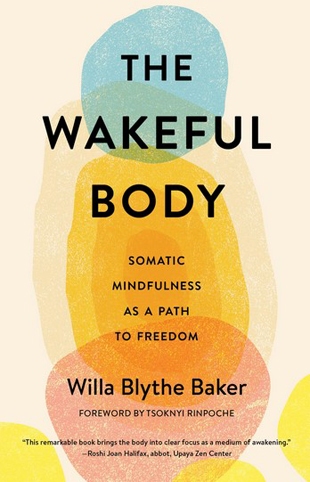One message of this book is that meditation is more than something to tick off your daily checklist. To meditate can help you access wisdom and understanding that are rooted only in your body.
Part One, “The Earth Body,” begins with where you have to begin, with what Baker calls “The Body’s Mindfulness.”
Part Two, “The Subtle Body,” includes chapter 6 on “Untangling,” looking closely at the influence of thoughts, appearances, and “the inner critic” inside of you. One of the practices Baker offers is for “Feeling Entanglement”:
“Watch your thoughts for a while. Notice how they surge and subside. Notice how your mind sticks to and follows some thoughts and sensory stimulation but not others. Notice how some thoughts lure you in. Notice how you try to push other thoughts away…. How does entanglement live in your body? What is happening with your muscles? Your shoulders? Your abdomen? Your heart? Your energy? What is going on with your breathing?”
Part Three is “The Truth Body” and focuses on “Nurturing” and “Dissolving.” Here is one quick and useful practice for nurturing that involves noticing the freedom that comes only by “opening” a “trapdoor,” allowing yourself to fall through it:
“Mind the Gap: Witness your thoughts in a relaxed way, with no agenda, for a short time. Then pick a thought and follow it all the way to its point of dissolution. Rest in the gap between thoughts. Open the trapdoor and fall through. Stay as long as you can. Mind the gap.”
Buddhist teachers of every school inform Baker’s writing, including Thich Nhat Hanh, whose teaching of “Interbeing” is one of the most important of any tradition from the last century. Baker summarizes this as “the truth that nothing stands alone, that everything interweaves with everything else. Everything inter-is.” Baker then applies this to your body:
“The body demonstrates interbeing with every breath. With every inhale, we take the outbreath of trees into our bodies. With every exhale, a part of us joins the earth. We cannot live for a single moment without the constant exchange between our bodies and the natural world.”
